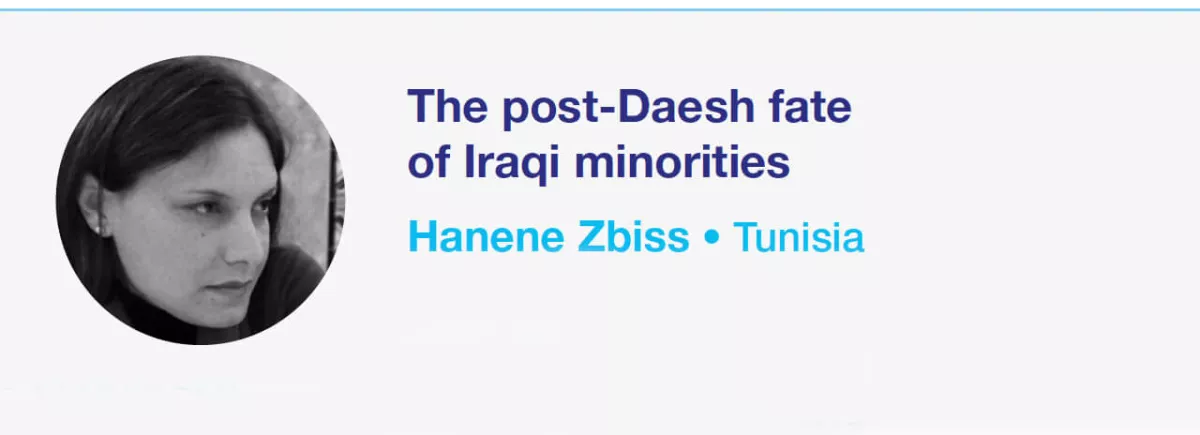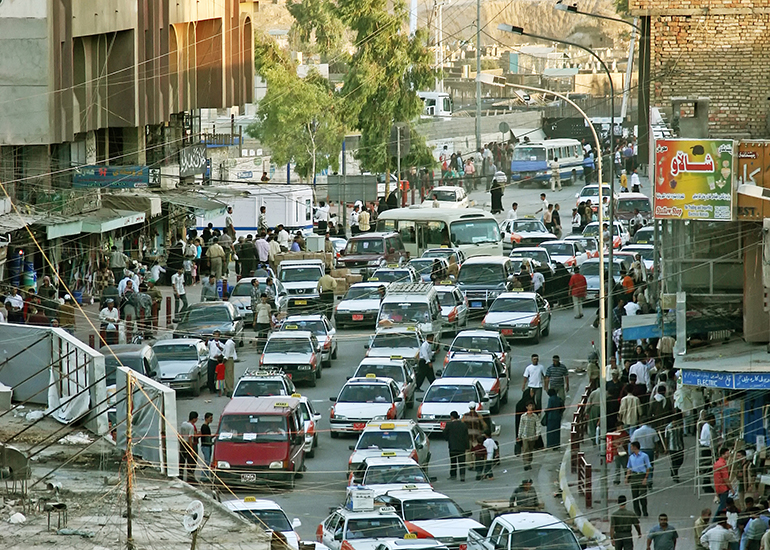
The post-Daesh fate of Iraqi minorities
Related project
NaseejDiscover a selection of the best articles dealing with cultural and religious diversity in the Middle East, entered in the Naseej competition launched by CFI and SKeyes in October 2017.
This week, the Tunisian journalist Hanene Zbiss, discusses the fate of the Christian and Yazidi minorities persecuted by Daesh in Iraq.
Published in Leaders on March 3, 2017.
When I lived in Erbil, in Iraqi Kurdistan, I used to live in Ankawa, a Christian district and one of the chicest in the city, distinguished by its nicely arranged houses, clean streets and beautiful churches. This was my first contact with Iraq's religious and cultural diversity. I lived in this beautiful, tranquil neighbourhood for two years without sensing any difference. From my home, I could hear the sound of the bells of the nearby churches, albeit ringing somewhat timidly so as not to disturb the majority of Erbil's Muslim Kurdish residents.
[…]
Break in the social fabric
In 2004, as the country entered into a sectarian war, minorities, especially Christians, became easy prey for the Muslim majority, Sunni and Shia alike. Despite clashes between these two groups, they both targeted members of the Christian minority, looting their money and property and evicting them from their homes, not to mention assassinations, abductions and attacks carried out on their places of worship.
Between the fall of the regime and now, over 60 churches have been attacked in the whole of the Iraqi territory. These attacks have never stopped, they were even exacerbated when Daesh entered the country and invaded entire regions, more precisely Mosul and the Nineveh Plains where, historically, Christians have been settled since the 1st century AD. So, Christian towns, such as Tel Keppe, Telskuf, Bartella, Qaraqosh, Karemlash, etc. fell, one after the other, Tel Keppe, Telskuf, Bartella, Qaraqosh, Karemlash, etc.
Although the Islamic State organisation (IS) regards Christians as “People of the Book", it has not spared them. The fighters invaded Mosul on 10th June 2014 and, a few days later, imposed restrictions on Christians. First of all, they cut their rations and cut off their electricity. Then they began singling out their houses, marking them with the letter “ن“ standing for “Nazarene", i.e. Christian. The restrictions reached their height with the call made at dawn on 18th July 2014, through the mosques' loudspeakers, commanding them to choose between converting to Islam, paying a tax (jizya) or leaving the city. They were given a deadline of noon the next day. Mosul's Christian residents hurried out of the city, taking with them very few of their possessions and leaving behind homes and shops that the IS fighters immediately took over, establishing themselves there. The story does not end there: they were intercepted at check points on leaving the city and the money, valuables and identity papers they had taken with them were confiscated. They were also forced to abandon their cars and walk to neighbouring towns in Iraqi Kurdistan (Erbil and Dohuk).
The displacement of 100,000 Christians from their regions in the Nineveh Plains
I witnessed their arrival in Erbil as they arrived from Mosul and other villages in the Nineveh Plains that had fallen into the hands of IS. At sunset one day in July 2014, a group of displaced Christians arrived, piled one upon the other in cars and trucks filled to bursting point. They stopped at one of the sports clubs which, like all the churches and schools in the region, had been turned into a refuge for those fleeing IS brutalities. They were in a state of shock after the atrocities they had faced along the way and most of them could not actually believe they were finally safe.
Their eyes were tinged with fear, filled with dread and uncertainty about their future. Their bodies and clothes were covered in dust.
[…]
Overnight, Ankawa was transformed into an enormous open air camp. Thousands of displaced people piled into its churches and buildings, even those not yet finished. Over 100,000 Christians fled their regions in the Nineveh Plains, one of the biggest waves of exodus since 2003, reminding them of previous waves out of Baghdad and towns in the south of the country, and filling them with the profound conviction that Iraq was no longer a safe country for them. Applications for asylum in Europe, America and Australia thus multiplied and Kurdistan became just a temporary staging post whilst waiting to cross neighbouring countries, namely Jordan, Turkey and Lebanon, to get to the West.
[…]
Moreover, although the battle to retake Mosul, which began on 17th October 2016, allowed the liberation of the majority of the Christian villages that had fallen into the hands of Daesh, many Christians no longer want to return, especially after witnessing the destruction of their houses and villages. Reconstruction will require large sums of money and there is nothing to guarantee that the persecution scenario will not be repeated, given the instability and radical tendency of the Muslim majority in Iraq (Sunnis, Shi'ites and Kurds). So, the Christians have called for the creation of their own independent province, like the Kurds in northern Iraq, as Georges W. Bush had promised them.
Nevertheless, whilst waiting for this dream to come true, they have armed themselves and formed militias called “Nineveh Plain Protection Units", to protect their regions, having lost confidence in any other party to ensure their defence.

The Yazidi genocide
The Christian minority is not the only minority to have been targeted by Daesh. The murders and tortures that IS perpetrated against the Yazidi were even more atrocious, as they regarded them mainly as “infidels". Members of this minority practise an ancient, peaceful religion, founded on the existence of a single, all-powerful God who governs the universe, aided by seven angels.
During their presence in Iraq, dating back to 3000 BC, they have suffered 73 genocides, carried out by a succession of leaders governing the country. The latest genocide against them is that committed by the IS who, in August 2014, invaded Sinjar, a historically symbolic region for the Yazidi. The Sinjar attack, carried out by Daesh fighters in their 4x4s, with their black flags, was synonymous with a death sentence for the inhabitants.
About 300,000 Yazidis found themselves surrounded on all sides, having been abandoned by the entire world, including by the Kurdish Peshmerga fighters, with whom they share a language and nationalism. In fact, the latter suddenly withdrew from the Yazidi regions, towards the neighbouring border with Syria. A few young Yazidi attempted to defend their regions with rudimentary weapons but their resistance quickly collapsed in the face of the Daesh arsenal. They therefore had no other choice but to flee or die.
Those who escaped the clutches of Daesh took refuge on the nearby mountain, Mount Sinjar, which became their only place of safety. About 30,000 families gathered there but they lacked all basic resources for eating, drinking, cover and survival. These families remained for a week, without any shelter, on this arid, barren mountain. Many of the elderly and children died. Even aid sent to them via rescue planes was destroyed once it reached the ground. This nightmare only ended when fighters from the Kurdistan Workers' Party (PKK), based on the Syrian border, succeeded in opening up a corridor on the mountain towards Syria, thus enabling about 100,000 Yazidi to get out
of there alive.
The survivors were distributed between camps in Syria and Iraqi Kurdistan. However, the fate of about 3,500 people remains unknown, presumed to have been killed or abducted. Indeed, in all of the villages under its control, IS would gather together all the inhabitants into schools, separating the men from the women and then would kill the men and transport the women and children to its locations in Mosul, Tal Afar and Raqqa. Around 5,000 women and girls were held captive, raped, enslaved and forced to abandon their religion to convert to Islam.
[…]
The Daesh attack on Shia Turkmen
All this now makes any coexistence between Arabs and Yazidi impossible. Despite the liberation of Sinjar from the clutches of Daesh over a year ago, very few Yazidi have returned there. This was the town they used to share with Arabs, Turkmen and Kurds. Their sole concern now is to leave Iraq and get to Germany and other European countries, sacrificing their ancestral land, the location of all their sacred sites. Some decided to arm themselves for protection, having lost confidence in their Arab and Kurdish fellow citizens, and even in government forces. They set up a military force in Sinjar, trained by PKK fighters, which is currently taking part in the war against Daesh.
Today, when asked about their vision of the future after the exit of IS from Iraq, they answer that they would either like to leave Iraq or stay there, but in a region under international protection.
CThese wishes are also shared by the Shia Turkmen who, like the Yazidi, have been affected by Daesh attacks on their towns at Tal Afar and Amirli. Some 200,000 people have been forced to abandon their towns and villages to flee Daesh, which makes no distinction between young and old or men and women, killing all those they find in their path and causing others to flee, forced to take refuge in Shi'ite regions in southern Iraq. To date, the fate of 1,200 people abducted by Daesh, half of whom are women and children, remains unknown.
Is emigration now the final solution?
With the approach of Daesh's final exit from Iraq, the question arises of the future for minority groups, given the instability and difficulty, or even impossibility, of a renewed coexistence after the rupture of the social fabric, the extinguishing of any trust between the various elements of Iraqi society, and the general fear and desire for revenge. In regions like Sinjar, where Arabs, Kurds, Yazidi and Turkmen used to coexist, it is now impossible to imagine that this same town will be able to bring them together once again. The same goes for Tal Afar which used to bring together Sunni and Shia Turkmen, before the former joined with Daesh to annihilate the latter.
Even the Christians, who represent the largest and oldest minority in the country (with over 1.2 million people), no longer intend returning to their regions after what happened to them. They prefer to stay in Iraqi Kurdistan or leave the country.
[…]
Will Iraq turn into a country without any minorities, to become the theatre of combat between Sunni, Shia and Kurdish Muslims? Will Mesopotamian civilisation, the first human civilisation, lose its cultural, religious and ethnic diversity for ever?
Find the ten finalists of the Naseej competition in the What does the future hold for minorities in the Middle East?



